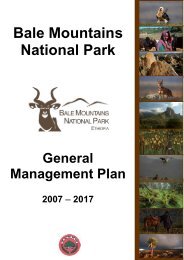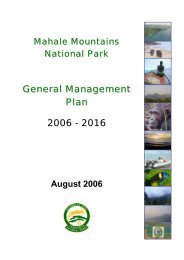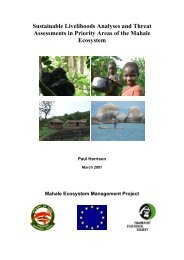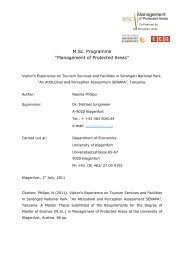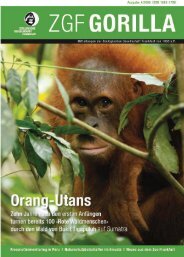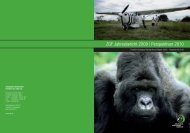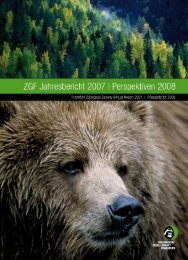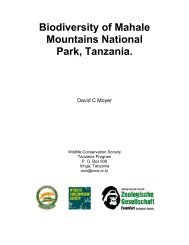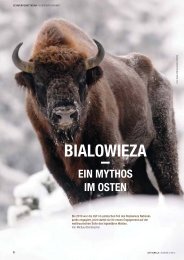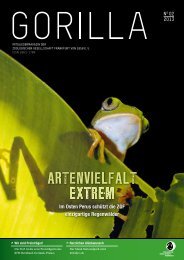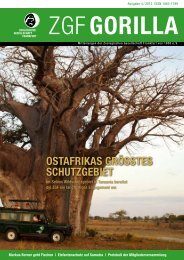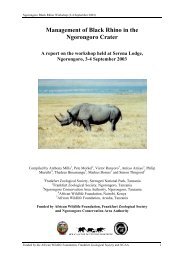Walia Special Edition on the Bale Mountains (2011) - Zoologische ...
Walia Special Edition on the Bale Mountains (2011) - Zoologische ...
Walia Special Edition on the Bale Mountains (2011) - Zoologische ...
You also want an ePaper? Increase the reach of your titles
YUMPU automatically turns print PDFs into web optimized ePapers that Google loves.
of management decisi<strong>on</strong>s thus informing targeted development support <strong>on</strong> <strong>the</strong> basis of household<br />
attributes such as, educati<strong>on</strong>, skills, and social status.<br />
Despite local variati<strong>on</strong>s in direct use values from principal livelihood comp<strong>on</strong>ents, aggregate<br />
household value is found not to significantly differ between kebeles. These findings suggest a<br />
baseline level of goods and services are needed to sustain a certain level of wellbeing; a subsistence<br />
level. Derived from <strong>the</strong> three key comp<strong>on</strong>ents, crops, livestock and forest products, household<br />
producti<strong>on</strong> decisi<strong>on</strong>s are based <strong>on</strong> local envir<strong>on</strong>mental c<strong>on</strong>diti<strong>on</strong>s, as well as access to arable land.<br />
Where land is unsuitable for ploughing and crop growth, households may rely more heavily <strong>on</strong><br />
livestock producti<strong>on</strong>, or where access to grazing lands is limited, forest products can be relied up<strong>on</strong><br />
instead. Chiri exemplifies this, as <strong>the</strong> presence of forest coffee is such a substantial source of value<br />
that households rarely report any sec<strong>on</strong>dary work activities after agriculture, within which <strong>the</strong>y<br />
include <strong>the</strong> harvest of forest coffee, and so Chiri derives <strong>the</strong> lowest value from both livestock and<br />
crop producti<strong>on</strong>. The livelihood strategies of communities are a balance of <strong>the</strong> principal comp<strong>on</strong>ents<br />
of direct c<strong>on</strong>sumptive use value according to <strong>the</strong> availability of natural resources; <strong>the</strong> divergence of<br />
relative value is ecological ra<strong>the</strong>r than ec<strong>on</strong>omically based.<br />
In light of <strong>the</strong> significant lack of job opportunities in <strong>the</strong> <strong>Bale</strong> <strong>Mountains</strong> Eco-regi<strong>on</strong>, it<br />
is possible that <strong>the</strong> ec<strong>on</strong>omic value derived from <strong>the</strong> comp<strong>on</strong>ents assessed in this study represent<br />
<strong>the</strong> major income of <strong>the</strong> household. If this were <strong>the</strong> case, <strong>the</strong> c<strong>on</strong>sistency of <strong>the</strong> estimated direct<br />
c<strong>on</strong>sumptive use value over kebeles suggests that this is <strong>the</strong> ec<strong>on</strong>omic value required for a household<br />
to make ends meet. With <strong>the</strong> observed high rates of time preference found in Ethiopia due to lack<br />
of saving and investment opportunities (Pender and Walker 1990; Holden et al. 1998) this would<br />
be rati<strong>on</strong>al; <strong>the</strong>re are no incentives for households to produce more than required to cope from<br />
year-to-year. In keeping with our subsistence <strong>the</strong>ory, income from sold produce will be used for<br />
basic household expenses such as additi<strong>on</strong>al food, clothing, medical fees, school fees, household<br />
utensils, and transport fees, as well as for social obligati<strong>on</strong>s such as community c<strong>on</strong>tributi<strong>on</strong>s, tax<br />
and cerem<strong>on</strong>ial expenses. This annual income amounts to US$287 ± 16.16 per pers<strong>on</strong>, or a daily<br />
per capita value of US$0.79 ± 0.04. This is higher than <strong>the</strong> Ethiopia wide average GDP per capita<br />
value of US$114 (UNDP 2007) supporting <strong>the</strong> generalisati<strong>on</strong> that <strong>the</strong> <strong>Bale</strong> <strong>Mountains</strong> Eco-regi<strong>on</strong><br />
is a relatively ‘rich’ area relative to <strong>the</strong> rest of <strong>the</strong> country. While households rely <strong>on</strong> comp<strong>on</strong>ents of<br />
direct c<strong>on</strong>sumptive use value according to site specific resource endowments, <strong>the</strong> finding that mean<br />
household value does not vary significantly between survey sites allows us to c<strong>on</strong>fidently aggregate<br />
direct c<strong>on</strong>sumptive use value. The <strong>Bale</strong> <strong>Mountains</strong> Eco-regi<strong>on</strong> has an estimated populati<strong>on</strong> of<br />
1,277,131 rural dwellers. The annual flow of direct c<strong>on</strong>sumptive ecosystem goods and services is<br />
<strong>the</strong>refore, estimated at US$366,439,518. This is a substantial value and excludes o<strong>the</strong>r sources of<br />
value arising under <strong>the</strong> total ec<strong>on</strong>omic value framework. In resp<strong>on</strong>se to <strong>the</strong> c<strong>on</strong>tinued decline of<br />
managed agricultural land and natural areas, this assessment of ecosystem c<strong>on</strong>tributi<strong>on</strong> to ec<strong>on</strong>omic<br />
activity helps to justify <strong>the</strong> financial resources required to ensure that c<strong>on</strong>servati<strong>on</strong> targets are met.<br />
This household value can predict how changing resource access and management strategies will<br />
affect rural livelihoods and help determine <strong>the</strong> measures to be taken to meet both development and<br />
poverty reducti<strong>on</strong> goals.<br />
<str<strong>on</strong>g>Walia</str<strong>on</strong>g>-<str<strong>on</strong>g>Special</str<strong>on</strong>g> <str<strong>on</strong>g>Editi<strong>on</strong></str<strong>on</strong>g> <strong>on</strong> <strong>the</strong> <strong>Bale</strong> <strong>Mountains</strong> 194



